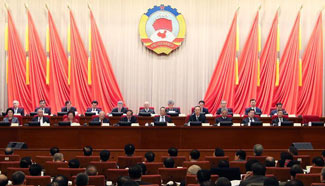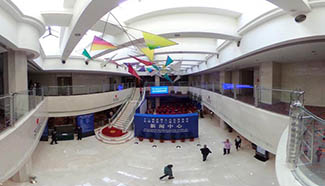ZHENGZHOU, Feb. 27 (Xinhua) -- On a foggy winter morning in Jiaozuo, central China's Henan Province, a large crowd had gathered around Wang Xiaoming to hear him sing.
The locally renowned singer and restauranteur explained that his performance was only made possible by a "cultural supermarket" launched by the local government.
The cultural supermarket is a one-stop shop for booking and requesting performances and other cultural activities, it hands the curational reins to the community.
"Its not just about booking performers, it is also a way for people like me to perform," he said, adding that it was his neighbors who had booked him.
The supermarket, launched in May 2015, is a website where people can book operas, movie screenings, and other cultural services.
It is a product of the "Internet Plus" campaign, which was designed to modernize traditional industries.
CUSTOMIZED SERVICES DELIVERED
"Based on Internet Plus, the 'supermarket' means our services reflect demand," said Jia Shujun, a publicity official with Jiaozuo government.
The "cultural supermarket" chimes with the new public cultural service law, to be implemented on March 1.
According to the law, public cultural services must be people-oriented, community cultural service centers must be improved and more products must be available online.
"Now the people can enjoy whatever they want," Jia said.
In the past, cultural events were managed by the government, meaning the options were limited.
"We have customized our services for the people," said Ma Zhenxia, an official at the bureau of culture in Wuzhi, the first county to trial cultural supermarkets in Henan.
"It is free to place an order on our website," she explained, adding that people could also access the service through WeChat, the instant messaging app.
Ma explained the process -- Once a booking is made, the performer can talk with the customer to confirm the details of the performance.
Moreover, locals can reserve venue online to use themselves.
Jing Suoding, a villager, is one of many who has benefited. A Yu Opera lover himself, he is grateful for the platform and resources.
"We used to pick a random spot on the streets to sing," Jing recalled. "Now we can reserve a dedicated 'stage' through the website."
"I also improved my skills a lot by watching live opera shows I booked through the 'supermarket'," Jing added.
"Here we see the integration of 'Internet Plus' and public cultural services," said Yang Chenghu, a researcher at the Communication University of China. "It showed us a new mode for developing public culture."
BOTTLENECK TO BREAK THROUGH
"The 'supermarket' is just getting started," said Cheng Dongsheng, head of the bureau of culture in Wuzhi, the mastermind behind the project. "We are currently held back by a lack of high-quality resources and talented performers."
Cheng's point was easily verified by the website itself. While there were around 30 opera groups available for live performances, all the troupes were based in the county, meaning the performances would all be very similar.
The lack of variety, Cheng said, is down to the fact that the province does not have reputable art schools.
"There are only 3 art colleges in Henan, none of them are particularly well renowned," he said. "That makes it difficult for us to recruit talented people for cultural services, especially in rural villages."
Zhang Yiwu, professor at Peking University, was reticent to place the blame solely on the lack of art schools.
"The talent pool is under-utilized," he noted. "The attention they get from both the government and the public is not enough."
PEOPLE TAKE OVER
These problems were not overlooked by the local government. At a meeting on cultural supermarkets in January, Jia Shujun stressed the importance of refining the way the service can be accessed.
"Internet Plus has a bigger part to play," Jia said. "Focusing on phones better reflects the way people interact with online services, and makes it more convenient."
Cheng Dongsheng suggested that more performances, including concerts, should be introduced in the future.
"Now that the population are better off, they want better cultural activities, too," he said. "It makes sense for us to charge them a lower price to enjoy the 'bigger' performances we buy."
Besides, according to Cheng, the "supermarket" should be more than presenting the people with performances and screenings.
"The ultimate goal of this project is to encourage people to coordinate cultural activities themselves."
Their work is paying off, following government funding of 20 million yuan (2.9 million U.S. dollars) since 2014, there are now 1,020 cultural groups in the county, featuring various art forms.
In this case, Zhang Yiwu pointed out the role of Internet celebrities, including restauranteur Wang Xiaoming.
"The might be what public cultural services need," Zhang said, calling Internet celebrities a "new cultural force."
"Connecting them with the cultural market and the locals means a lot," he added. "The public will be inspired to play their part, too."


















